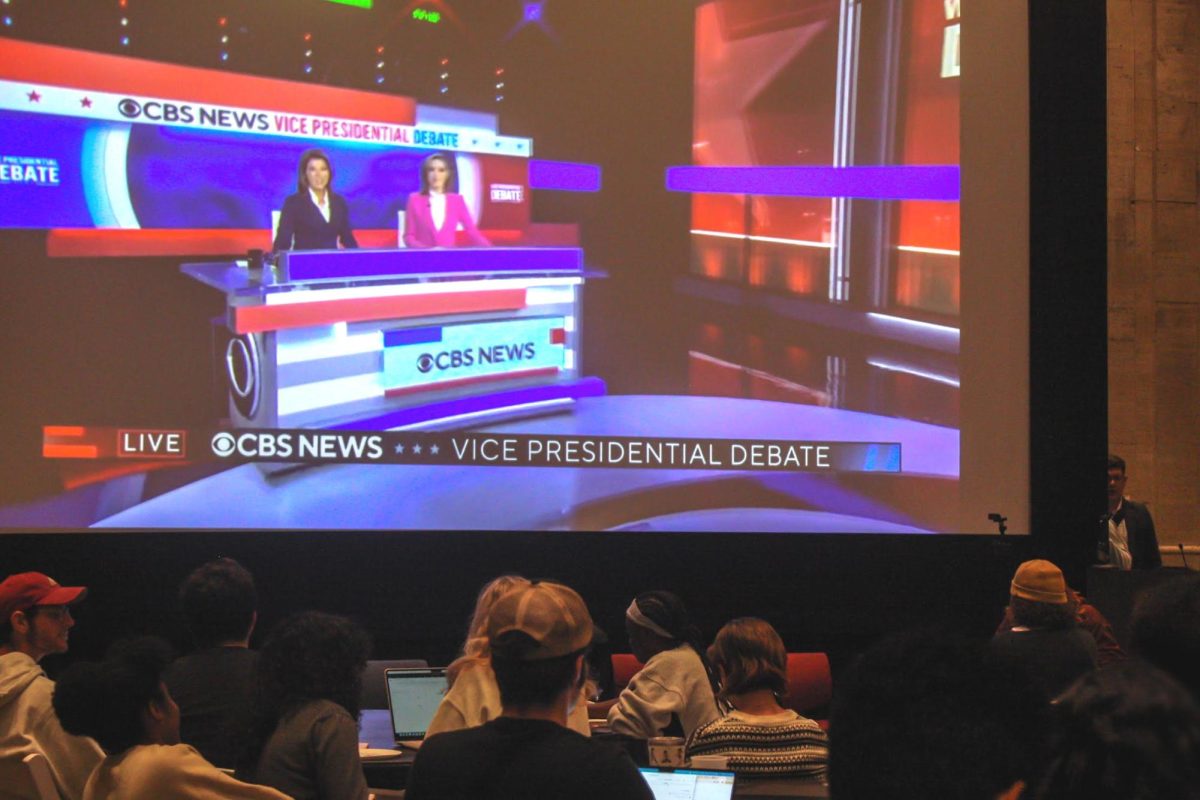Dozens of Emerson students packed the Bill Bordy Theatre Tuesday night, ready for what they hoped would be a clash of political titans in the 2024 vice presidential debate. Many said they were surprised to witness one of the most civil debates in recent American history.
Gov. Tim Walz of Minnesota and Sen. JD Vance of Ohio discussed immigration, abortion, and the 2020 election result in a battle to control the narrative around their running mates.
“I was struck by how frequently both candidates emphasized the agreements they had in certain policy matters,” said Noah Sheasby, a first-year theater and performance major.
The two vice presidential candidates spent the debate expressing moments of respect for each other’s perspectives while bashing their running mate’s competence for the role.
“I think both sides were rhetorically strong, stuck to their guns policy-wise, and remarkably civil,” Sheasby added.

In the debate’s first half, Vance appeared confident talking on live TV. He allowed himself to dodge questions and talk about his upbringing or other personal anecdotes. Later on, he used the stage to offer a revisionist history of former President Donald Trump’s policies. When referring to Trump’s repeated attempts to repeal Obamacare, Vance said Trump “salvaged” it.
Sheasby said, “Vance was able to present his campaign and his ticket as more palatable and less extreme as Trump came across in the presidential debate.”
Walz started the debate nervous at times and paused for long seconds before completing his point. He attempted to reiterate points made previously by Vice President Kamala Harris that call Trump’s policies into question, yet often failed to find his footing.
“I do think that frequently we heard a lot of the same talking points that we’ve heard throughout this election cycle,” Sheasby said.
Around the 44-minute mark, the question of abortion flipped the power balance of the debate. Walz emphasized “pro-women” rhetoric, whereas Vance attempted to rewrite the heated issue as a pro-family angle that advocates tax cuts. The moment shifted the debate and placed Walz on the offense and Vance scrambling for answers.
Referring to the Jan. 6 insurrection, Sheasby said, “Walz was especially stout in his defense of the peaceful transition of power and the democratic values that we have that unite us.”
Throughout most of the debate, Walz and Vance said they agreed with the other candidate’s points but overall disagreed with their running mate. Walz finally found his assertiveness when debating Trump’s refusal to accept the 2020 election results. Walz asked Vance if Trump lost in 2020, to which Vance replied he was “focused on the future.” Walz called it a “damming non-answer.”

The close debate led some Emersonians to believe it would not sway many voters in November.
“I don’t think this moves the needle for either campaign a whole lot,” said Henry Jones, a second-year political communication major. “I think people who came to watch it already know who they’re voting for.”
Jones thinks Vance won the debate overall because of his rhetoric and how prepared he seemed.
He added that the debate wasn’t exciting enough and “put most people to sleep.”
However, the crowd in the Bordy theatre roared with laughter at times when the debate’s moderators, Norah O’Donnell and Margaret Brennan of CBS News, acted on their threat to mute the candidate’s mics after Vance attempted to extend his answer on immigration.
“Gentlemen, the audience can’t hear you,” Brennan said. “Because your mics are cut.”
The cordial spirit of the debate masqueraded a few false or misleading claims made by the two candidates.
The moderators—instead of fact-checking on the spot—pushed Vance and Walz to clarify their answers when it appeared they were steering too far from the question. Walz called himself “a knucklehead” for previously claiming to be in Hong Kong during the June 4, 1989, Tiananmen Square protests in Beijing.
Angus Abercrombie, a third-year political communication major said that “for a VP debate to matter, you really need a slam dunk, and I don’t think either campaign got that.”
“What we did see is how dangerous JD Vance will be as a vice president to our democracy,” he added.
Abercrombie disagrees with “the way [Vance] talks about immigrants and economic policy, throwing out studied views of experts in preference for rhetoric.”
He said that continuously lying “doesn’t hold water,” and that “when your debate performance is full of holes—you can’t win.”